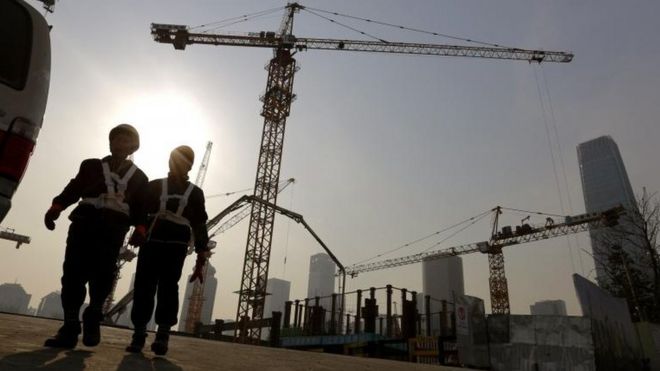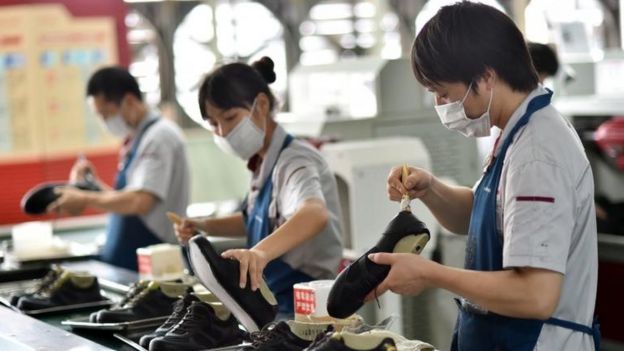What is China's 'new normal'?
- 24 September 2015
 AP
AP
What a difference two years make, in China.
In the autumn of 2013, when I was making my documentary "How China Fooled the World" - which you can watch by clicking here - the prevailing view among Chinese business leaders and government officials is that China's growth "miracle" would go on and on and on.
So the film, which argued that the world's number two economy is heading for a sharp slowdown in growth and a possible crash, caused considerable grumpiness among China's authorities when it was broadcast.
And Beijing had shouty allies in the West's many bankers and investors, who have been long-term bulls of China. Goldman man (as it were) told me I simply didn't get it: China was and is unique; it would therefore be the one economy in history not subject to the normal rules of financial gravity.
What is therefore striking about my current trip to Shanghai, Beijing and Wuxi (a second tier city more-or-less the same size as London) is that the film's core argument is now conventional wisdom among officials and business leaders.
Pretty much everyone I met said that since the 2008 global financial crash, China had become dangerously dependent on debt-fuelled investment, in infrastructure, housing and heavy industry in particular.
They recognise that if China were to continue investing at a globally unprecedented rate of 50% of national income - greater than even Japan at its 1980s peak - and accumulating debts at an annual rate of more than 15% of GDP, there is a serious risk of a calamitous Japanese crash á la 1990.
So the new economic gospel among the Chinese elite is that growth needs to slow down, and is slowing down, because there has to be a reconstruction or rebalancing of the economy more towards consumer spending and technological innovation.
 AP
AP
What shocked me (and I am not normally shockable) is that most business leaders and investors I met said that what they saw as a "transition" was proving painful - and would lead to the collapse of some businesses, especially in heavy industrial sectors where there is significant over-capacity.
And no one tried to persuade me that China isn't changing gears - from an annual growth rate of 10% before 2008, and 7% till recently - to a significantly lower rate of growth. You can see some of what China's company bosses said to me in a film I've made for News at Ten tonight.
Where there is disagreement is the level of what Beijing officials blithely call "the new normal" for growth: I heard 5%, 4% and 3% as being the probable base for the next decade.
To be clear, if it is any of those numbers, that represents a dramatic change both in the momentum China can provide to the global economy and to the annual increments Chinese people can expect for living standards.
So this "transition" is as significant - in a long-term sense - as any global economic event of the past 30 years. We have already seen some of the effects in tumbling prices for commodities and energy, as China's appetite wanes, and in the stagnation of living standards in its many client and competitor economies.
The prospects for commodity and energy producers, from Australia, to Russia and Brazil, aren't what they were. Other emerging market manufacturers, from Malaysia to Mexico, have much to fear from China's devaluation and redoubled attempts to use technology to improve productivity.
Perhaps half the world, in an economic sense, is damaged by this Chinese recalibration. And although there is a boost to living standards in consumer economies like ours - from falls in the price of energy and other imported goods - that windfall cannot compensate in the longer term for a world growing slower.
And the risk of a fully-fledged Chinese crash - tumbling prices of bloated property and shares, companies and municipalities unable to repay debts - is not de minimis.
The really big point for me is that the psychology of those making important economic decisions in China appears to have shifted fundamentally. Until this trip, what I always found exhilarating about China was the exuberance and optimism of everyone I met.
Now I encounter a sense of caution and mild anxiety. Which may represent a scaling back of lending and investing exuberance just in the nick of time. Or it could be one nudge from the kind of collective pessimism that triggers serious economic shocks.

No comments:
Post a Comment
Comments always welcome!